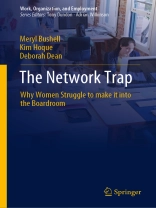As we begin the third decade of the twenty-first century, women have entered the workplace in unprecedented numbers, are now outperforming men in terms of educational qualifications, and are excelling across a range of professional fields. Yet men continue to occupy the positions of real power in large corporations.
This book draws on unique, unprecedented access to Chairs of FTSE 350 Chairs, boardroom aspirants and executive head-hunters, to explain why this is the case.
The analysis it presents establishes that the relative absence of women in boardroom roles is not explained by their lack of relevant skills, experience or ambition, but instead by their exclusion from the powerful male-dominated networks of key organisational decision-makers. It is from within these networks that candidates are sourced, endorsed, sponsored, and championed. Yet women’s efforts to penetrate these networks are instead likely to trap them into network relationships that will beof little value in helping them to fulfil their career aspirations.
The analysis also identifies why women struggle to gain access to these networks, and in doing so, it demonstrates that the network trap in which women find themselves will not be overcome simply by encouraging them to change their networking behaviours. Instead, there is a need for a fundamental reconsideration of how boardroom recruitment and selection is conducted and regulated, to ensure the development of a more open, transparent and equitable process.
Tabela de Conteúdo
Chapter 1: The ‘problem’ of women on corporate boards.- Chapter 2: Explaining the lack of women in the boardroom: social capital and networking.- Chapter 3: The role of social capital and networking in board selection processes.- Chapter 4: Human capital theory, preference theory, attribution theory and self-efficacy.- Chapter 5: Gender differences in social capital and networking.- Chapter 6: Are women less willing and able to leverage their social capital?.- Chapter 7: Discussion and conclusion.
Sobre o autor
Meryl Bushell Ph D is Visiting Fellow, Warwick Business School, University of Warwick. She has many years of senior management experience in FTSE 100 organisations. She is an established and experienced non-executive Director and a strategic advisor to public and private sector bodies.
Kim Hoque is Professor of Human Resource Management at Warwick Business School, University of Warwick, and is the Director of the Industrial Relations Research Unit. He has published widely across the employment relations, human resource management and equality and diversity fields. He has worked closely in either an advisory or consultancy capacity with both public and private sector organisations, trade unions, government agencies, and Parliamentary bodies. Deborah Dean is Associate Professor of Industrial Relations at the University of Warwick, Coventry, United Kingdom. Her research focuses on equality issues in employment and the interrelation of legal, social, and culturalregulation of work. She has written reports for and given evidence on employment inequalities to policymakers in the European Commission and UK Parliament.












